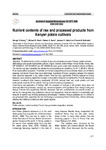| dc.description.abstract | Objective: To determine the nutrient contents of raw and processed products of Kenyan potato cultivars.
Methodology and results: Eight potato cultivars (Tigoni, Desiree, Dutch Robyjn, Kenya Karibu, Kenya Sifa,
CIP 393385.47, CIP 391696.96 and CIP 393385.39) were grown under local standard cultural conditions.
The mature crop was harvested and allowed to cure at ambient air conditions (15-19 °C /86-92 % RH) for
three weeks before evaluation. Proximate and mineral compositions of raw and boiled tubers and of freshly
prepared and frozen French fries were determined. Significant (P≤0.05) variations between the cultivars
were observed especially in dry matter content. Total ash was significantly (P≤0.05) reduced on boiling
basically due to leaching. Apart from increase in fat content, frying did not significantly (P>0.05) reduce any
chemical constituent while freezing significantly (P≤0.05) reduced total ash, crude protein and total
carbohydrate contents. All the cultivars had high levels of sodium and potassium.
Conclusions and application of findings: With the exception of increase in fat content, frying does not
adversely affect the proximate, chemical and mineral composition of the potatoes. Even though boiling and
storage in frozen form significantly (P≤0.05) decreases total ash, carbohydrates and mineral content; as
well as iron, manganese, zinc, potassium, calcium and magnesium, these are retained in considerably high
amounts to warrant use of these processing technologies. Therefore, Kenyan potatoes can be utilized in
any processed form, especially the new technology of processing frozen French fries, without adversely
affecting the nutritional content and other quality aspects. | en_US |

